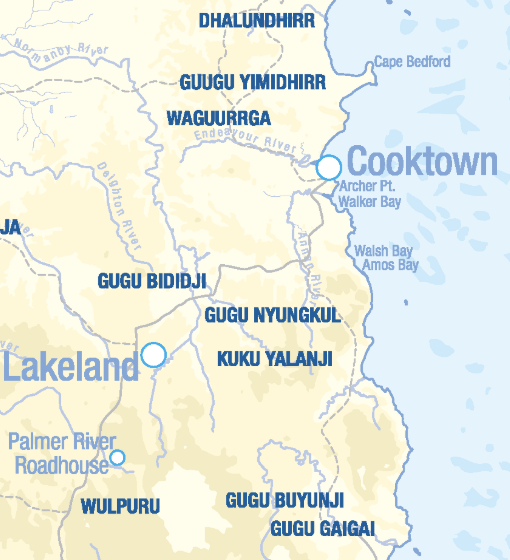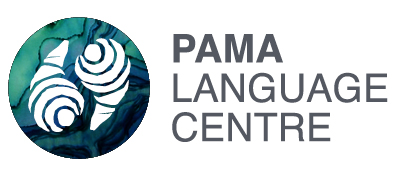Kuku Yalanji

DISCLAIMER:
The locations of the language varieties of Cape York Peninsula shown on this map are not intended for Land Claim use, and are an approximate guide only. Individual language project locations are based on information from publicly available documents.
This map is a work in progress and is to be regarded as a dynamic draft. Pama Language Centre welcomes additions and corrections to the draft map and to information about the language varieties listed.
This language variety currently does not receive Pama Language Centre support. If this is your language variety and you would like Pama Language Centre to support language recording, revival, revitalisation or maintenance activities for this language variety, please CONTACT US.
Click here to explore Kuku Yalanji

Click here to add your own text
| AUSTLANG reference | Y78 | AIATSIS Code |
| AUSTLANG reference name | Kuku Yalanji | AIATSIS reference name |
| OTHER REFERENCE CODE(S) | ISO 639-3 code | |
| LANGUAGE VARIETY NAME, PHONETIC TRANSCRIPTION | Phonetic transcription of language variety name with IPA | |
| LANGUAGE VARIETY NAME, PHONEMIC TRANSCRIPTION | Phonemic transcription of language variety name with IPA; Hyperlink to a webpage with a phonology chart of the language variety. | |
| LANGUAGE VARIETY COMPLEX | Name of largest mutually intelligible complex. | |
| LANGUAGE STATUS | Assess and apply EGIDS
Select: Revival, Revitalisation, Renewal, Reclamation, Maintenance. Perhaps also include Second Language Learning if non-ethnic users are learning in an L2 situation. | |
| PRACTICAL ORTHOGRAPHIES | Lynette F. Oates, Kuku-Yalanji Dictionary. 1992.
Elizabeth Patz, A Grammar of the Kuku Yalanji Language of Far North Queensland. Submitted for the degree of Doctor of Philosophy in the Australian National University. December 1982. Henry D. Herschberger and Ruth Herschberger: Kuku-Yalanji Dictionary. Work papers od SIL-AAB, series B volume 7. Darwin 1986. In Papers on the Languages of the Australian Aborigines: | List of practical orthographies (including obsolete ones) that have been used or are used to write texts. In the name of the orthography is included the year of first use or description of orthography in print. Format: LANGUAGE NAME 19XX ORTHOGRAPHY These names are PLC’s reference names for orthographies. Include references for each orthography. Exclude orthographies from linguists’ grammar monographs if those orthographies have not been used by speakers. |
| CURRENT LANGUAGE ACTIVITY | Kuku Yalanji classes for all students in Mossman State School since 2018. | Overview of current activities
and links to relevant projects within website |
| HISTORICAL BACKGROUND | Summary of Present Situation, Past Investigations + links to further reading | |
| LINGUISTIC NOTES & SOURCES | Include any standardisation efforts, regularisation, engineered phonology (e.g. diachronic syncope, aphaeresis…). List any available sources, link to any online resources. | |
| PAST LANGUAGE REVIVAL ACTIVITY | Include any previous (pre-Pama Language Centre) revival (or other type) of work. Include production of texts (Bibles, newspapers…), recordings (songs, dance videos, other videos…). Include other language-related activities (scripted welcome-to-countries…). | |
| TEACHING & LEARNING RESOURCES |
Godumu Kugu: The New Testament in Kuku-Yalanji. World Home Bible League 1985. Production of ebooks and printed books since 2017: Balkan Balkal Kuku Kubirrika Yala Manjalaka. | Links to Pama Language Centre resources and open access resources, link to PLC shop if valid. Include any online resources (wordlists, online forums, facebook groups) |
| DICTIONARY | WATCH THIS SPACE | List links to Dictionaries. List Harvard-system reference. |
| OPEN ACCESS ARCHIVAL RESOURCES | Link to archival resources, conditions of access to be determined by relevant ALAT. | |
| FIND A TRANSLATOR | List details of all those capable of translations, esp NAATI-qualified. | |
| CONNECT WITH SPEECH COMMUNITY | Facebook groups, community websites, phone numbers. NGOs, Local groups (church, youth, women, men, clan…) | |


